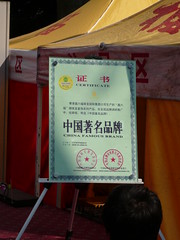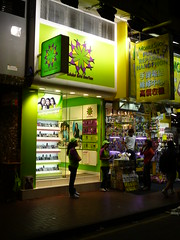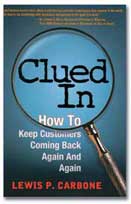- The onliness of Strong Brands is a BusinessWeek article about ZAG, a new book from Marty Neumeier. The book talks about the "onliness" of brands, meaning their uniqueness. It emphasize the need to create unique experiences as opposed to best experiences, arguing that best experiences leads to following common practices and fail to differentiate the brand. The article also emphasizes the need to link brands with long-term trends to create a bridge with customers, as well as be critical towards results from market research that sometimes fail to identify a killer product.
- (Links in French) WAT.TV is an online platform launch by French TF1 (The channel number 1 in France). In LeMonde, leading French newspaper, the article entitled "TF1 fait de la television avec du Web" (TF1 does TV using the Internet) discusses the new strategy employed by the channel to bridge traditional TV programming with the Web. The online platform allows the community to share pictures, videos, text and so on. On a weekly basis, the channel will choose a selection of short videos that they will broadcast late at night on their main channel. The authors of the videos receive Euro 100 for that. I find the approach pretty nice, but I wonder if a significant community can really emerge around a TV channel... it seems too restrictive to me.
- The last link is to the SonyEricsson ad that is showing right now on Hong Kong TV. The ad is very neat and nicely done... but at the end the phone rings and a guy says: "Hello...". Am I the only one who wants to complete the sentence with "Moto"? Every time I see the ad I think about Motorola more than SonyEricsson...
Thursday, November 16, 2006
Few links - 16 Sept. 2006
Wednesday, November 15, 2006
When Will They Get It?
Time passed...
... and passed...
And two days ago I decided, seeing one of these PCCW Now booths in the street to go and check for myself. I discovered that my contract was already over and that they just had continued to charge the service as usual. Well, I consider myself lucky that they did not start charging more without telling me, so that's fine.
Then the guy started to enumerate the different options I had to renew. Of course all of them were forcing me sign a new contract for 12 to 18 months, even though I have been a customer for more than 18 months. After some negotiation, he told me that there was a way for me to get a nice subscription and 3 months for free. He just had to treat me as a new customer, come to pick up my current set-top box and replace it by a brand new one.
Reluctant to sign for a long contract, I asked him what would happen if I was switching subscription through the DIY (do-it-yourself) TV system they have. He told me: "Well, you would pay full price and get no discount."
To summarize, if as a customer I change my subscription I use the way that costs the least to the company, then I will pay the most (that's DIY). And if I ask the support person to stop my current contract and come to my place to exchange the hardware, then I will pay the least for the service. How could a company do something more mind-bending than that?
Well... This kind of things happen of course everyday, but I just had to write about it!
Tuesday, November 14, 2006
Is More Choice A Good Thing?
 Here is another great video taken from TED (Technology Entertainment Design) Talks. This one was made by Barry Schwartz in July 2005 following the release of his book "The Paradox Of Choice" (duration: 20 minutes).
Here is another great video taken from TED (Technology Entertainment Design) Talks. This one was made by Barry Schwartz in July 2005 following the release of his book "The Paradox Of Choice" (duration: 20 minutes).Please go check the Malcolm Gladwell video I posted earlier if you did not watch it.
In this talk, Barry Schwartz builds a very strong argument against providing too much choice to people. He highlights that in regards to choice, although too little is bad, too much can as well have a very negative effect on people on four different aspects:
- Regret and anticipated regret
- Opportunity cost
- Escalation of expectations
- Self-blame
If we look at clothing shops in Hong Kong for example, instead of having a simple Giordano, now you have Giordano, Giordano Ladies, Giordano Junior, Giordano Concepts. With every new type of store created, customers' expectations of how well a specific store can address their needs will increase, thus making it much more difficult to exceed these customers' expectations. Few choices answering specific needs and clear distinctions between each choice, rather than choice overload, is a winning formula.
Saturday, November 11, 2006
RSS for Everyone?
Even though RSS feeds have been around for a long time, their potential has not been fully utilized today. One of the reason for this is that whatever easy we believe, as heavy Internet users, it is to use RSS or to understand the logic behind, well it is not. I was transferring all my feeds this afternoon from MyYahoo to NetVibes, as I think NetVibes offers more flexibility for me to build my own "stay-in-touch-with-the-World" page. It took me hell of a lot of time... adding all the feeds and very often having to copy/paste RSS feeds URLs. And I am not even talking about finding new feeds here.
Talking about my dad again...
I am sorry that I will mention my dad again. Not that I have a fixation on him, but while he was visiting Hong Kong I gave him am Internet crash course! I decided to show him the power of the Internet and how it could change his way of working. Some stuff freaked him out, like being able to find pictures of the house he just bought in a tiny village in the South-East of France on Flickr. Others amazed him like the amount of information that can be found on Wikipedia. But above all, he felt most enthusiastic about RSS feeds and how it could help him save so much time... save time, that is once you have everything set up.
All this takes so much time
And that's where for me the major problem is. To be able to make an efficient use of RSS feeds, well on top of being very comfortable with all that Internet stuff, you have to have so much time. There is so much information out there that finding really interesting content is really a challenge, especially for the generation of people who did not grow up browsing the Web before they could speak. And this segment of the population is in dire need for information, as they hold position of major responsibility in multinationals for example.
Bloomberg for everybody
So, if we look at how things work in the Financial world, where Bloomberg and others feed real-time information to traders around the World. Wouldn't a concept like that nowadays work with general information where users could choose to be informed about special topics of interest? As many Web sites do it, it is great to leave it to the community to decide what is interesting, but for people with little Internet experience and little time, the task of choosing the type of content that is interesting to them could be left to one or several experts.
Following Pandora concept
A Web site that has nothing to do with information but that I find so great is Pandora, where the system builds a radio suited to your own taste, just based on the name of a band or a song that you provide. When a song comes up, you can just say that you like it or not and the system will tailor further the radio. It is that kind of simplicity that could make to my mind RSS feeds and information providers reach their full potential. Of course Pandora is a huge initiative that necessitates to review and categorize every piece of music that can be found. Could that be done with information? My feeling is that leaving an algorithm and the whole community do it may not be enough... and may leave out a part of the population who would be avid users is they were given the opportunity to try.
The Solution to Branding
On one of our errands, we saw a celebration in the street. A Hong Kong jewelry brand was celebrating a very important event. That brand had joined the exclusive circle of "CHINA FAMOUS BRANDS" as the certificate that they were showing off explained (see picture on the right).
That got me thinking... How can a certificate, be it from the most important government body, give you the status of a famous brand. Aren't the people supposed to decide which company is famous and which one is not?
Now, I am reading "1 Billion Customers" by James Mc Gregor right now (a book that I recommend to anybody with interest in doing business in China). In the book he explains how the Chinese government when there is a lot of money at stake will find ways to benefit more from it.
To me that example could be one of these. Branding, advertising and marketing in general are great sources of revenue. So, what if the government could issue a document that decided whether you were famous or not, whether your brand was a valuable asset or not, wouldn't that be a great power in the hands of the government?
Friday, November 10, 2006
Targeting the niche
Smartone brand is usually red and white, but this store closed to a Filipino hotspot in Hong Kong Causeway Bay has been totally rebranded to fit the community taste and even displays Bahasa language instead of English or Chinese. Shops assistants are of course Filipinos as well. With a huge Filipino community, dedicated Filipino shops are not uncommon in Hong Kong, but it is very uncommon for a "big" company to recognize the fact and spend the effort to research the needs of that community. With no other company following the example as thoroughly, Smartone surely has a huge lead in a community of several hundred thousands.
Friday, November 03, 2006
The Compliance Assistance Centre in Hong Kong
As one employee stated it when explaining what it was, if the Environment Protection Department is the stick (armed with laws and regulations), the Compliance Assistance Centre set up in September in
Wednesday, November 01, 2006
Blurring the line between real and virtual
The example of Toyota, which plans to build its own shop in Second Life selling customizable virtual cars is another kind of interactions between companies and customers, which to me offers much more appeal. If Toyota is creating great virtual cars that blend totally in the virtual world, it may very well have crucial impacts on its brand in the real world. But it is also a risky path... as the article points out, virtual communities are not easy to crack and blend into (The example of avatars bombing virtual stores is pretty scary). Second life also offers limited opportunities in terms of exposure due to the volume of its traffic... at the time I write this post, only 6,250 people are online.
Oh! That's Great!... oh... no, finally no...

That ad is displayed inside the MTR (Metro) in Hong Kong. It is an ad for the fast train that links the airport and a new exhibition hall. It says in big that you can enjoy a same day return trip to the AsiaWorld Exposition Hall for only HK$42, instead of a usual HK$100 if I am not mistaking. That sounds like great! Then you look at the right of the ad with all these street signs displaying places in Hong Kong Island and a big 42 next to each of them...
... unfortunately, when you look at the bottom of the ad, you can see that if you take a full ride from Hong Kong station (on the main island of Hong Kong like the places displayed on the signs at the top right of the ad) to the exibition hall, that will cost you HK$72. Still a nice discount but not as nice as HK$42.
I will never understand how an advertiser can manage customers' expectations so badly. You have a great discount, but by showing IN BIG a wrong figure you actually make people feel bad about the offer and about the company that is seen as trying to trick people. It would have been so easy to display the right price first or at least to change the copy and say: "Same day return trip ticket to AsiaWorld Expo FROM HK$42 up".
Enthusiasm is not enough
 The Hong Kong Government Environmental Protection Department had a large booth at the EcoAsia Expo dedicated to promoting its efforts. I spent extensive time there talking to the staff, exchanging ideas and learning about the latest initiatives implemented by the department. Among the initiatives are the Compliance Assistance Centre (CAC), EcoPark and the Municipal Solid Waste (MSW) Charging Scheme to which I will dedicate separate posts.
The Hong Kong Government Environmental Protection Department had a large booth at the EcoAsia Expo dedicated to promoting its efforts. I spent extensive time there talking to the staff, exchanging ideas and learning about the latest initiatives implemented by the department. Among the initiatives are the Compliance Assistance Centre (CAC), EcoPark and the Municipal Solid Waste (MSW) Charging Scheme to which I will dedicate separate posts.It was clear as well that the department was spending endless efforts and money on trying to make their message stick and change people’s habits. The booth was full of reports, booklets, leaflets, freebies and other posters aimed at explaining how to be a more environment-friendly citizen. As a researcher, I am not convinced at all though that all these documents are “sticky”, to use Malcolm Gladwell terms.


